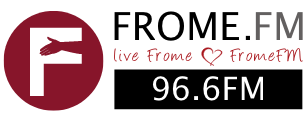Copyright and permissions
All rights, including copyright, in the content of the www.frome.fm web pages are owned or controlled for these purposes by Frome Community Productions CIC (hereon identified as FromeFM). All images/audio either belong to FromeFM or are used with permission/fair-use.
In accessing FromeFM’s web pages and material, you agree that you may only download the content for your own personal non-commercial use.
Except where expressly stated otherwise, you are not permitted to copy, broadcast, download, store (in any medium), transmit, show or play in public, adapt or change in any way any FromeFM content or programme material for any other purpose whatsoever without the prior written permission of FromeFM.
The Copyright, Designs and Patents Act 1988 says that copyright is an automatic international right that gives companies who are the creators of literary, dramatic, musical and artistic works the right to control the ways in which their material may be used.
Clarification of these rights within the act is enshrined in the FromeFM Volunteers Charter, which took effect in 2007 and was refreshed in 2013, under item 3.9.
Accept that all information compiled and all programme material made using the Station’s equipment and facilities, is the property of the Station unless express permission is given to the contrary.
The full charter is available to download from the following direct link FromeFM Volunteers Charter. This policy document is due to be refreshed again in 2018.
Introduction to Copyright
Copyright is an automatic international right that gives creators the freedom to decide what happens to their creations. You may use someone else’s work only if you have their permission by the copyright owner or if the law allows it, such as for fair-use
Copyright automatically applies to, and protects, all of FromeFM’s creative work. That means we are free to decide how other people can use our work and means that anyone else must ask permission before using our work. It doesn’t matter whether you’re a “professional” or not, the law is the same for everyone.
What does copyright protect?
The law in the UK defines the things which copyright automatically applies to.
Original works, for example writing, music, drama, art and photography, are protected by copyright. Films, sound recordings, typographical arrangements and broadcasts are also covered as long as they are not copied from a previous work of the same kind.
Here are some examples of original works that are copyright protected:
- Literary works – novels, song lyrics, newspaper articles, user manuals and exam papers
- Dramatic works – ballet, plays and mime
- Musical works – recorded original songs, advert or film soundtracks or instrumental music
- Artistic works – paintings, drawings, engravings, photographs, sculptures, maps, diagrams, architecture and craftwork
- Film – any moving image that can be reproduced, for example, cinema films, home videos or DVDs of television programmes
- Typographical arrangements – a published edition of a literary, musical or dramatic work, for example, a magazine design styling, film poster or book cover.
- Broadcasts – transmitted images sounds or information that can be received by members of the public
- Sound recordings – recordings of sounds that can be reproduced regardless of what they are made on (CD, MP3 or vinyl).
For FromeFM the majority of our copyright calls into the ‘Broadcasts’ and ‘Sound recording’ categories, but this is not an exhaustive list.
Stakeholders rights
Generally, while programme rights are likely to be held by FromeFM, as a whole broadcast, there will be other factors in play too. Ask yourself the following questions.
Who made it?
Which company owns/has made the programme? Do they own all rights within the programmes or do other people who have contributed to it still have rights in the programme too?
Who took part in it?
It’s helpful to break these down into different types, as they are treated differently in a copyright context:
- Performers – Who features in the programme? People like presenters, actors, interviewees etc.
- Musicians – Has the music been commercially released on CD or for download? Is the music from a live performance or event? Is it classical? If you wish to use music in any content you must have appropriate licences for your area (PRS/PPL/MCPS etc)
- Writers – Who is the writer of the script or the spoken content, including quotes and text extracts? Do the publishers of that work have any rights?
- Clips from other programmes – Who owns or licenses these rights? Do they fall under fair use?
FromeFM understands the importance of contributions presenters make with regards to programmes but there is a whole raft of supporting roles that get a show on the air. There are more obvious ones such as studio managers, producers and equipment engineers but also those hidden behind the scenes who develop the website, do our marketing & promotion, licensing, trainers, financial, legal & organisational admin and even those who do the cleaning. We are a community of volunteers and when a show is “Produced by FromeFM” we are all given a tacit nod for the work involved.
Legal implications of using FromeFM content
According to the act, it is an offence to perform any of the following without the consent of the owner:
- Copy the work without permission.
- Rent, lend or issue copies of the work to the public without permission.
- Perform, broadcast or show the work in public without a licensing/syndication agreement.
- Adapt the work without a licensing/syndication agreement.
Rights cannot be claimed for any part of a work which is a copy taken from a previous work. Unless express permission is granted, for example, changing the idents would technically be a breach under 4.) “Adapt the work”. The copyright of the samples remains with the original author no matter how much it is edited or manipulated.
Streaming or re-uploading this content without permission would also be a breach of 3.) “broadcast or show the work in public”. You may not re-upload FromeFM content to platforms such as Soundcloud, Podomatic, iTunes, YouTube, Facebook or Mixcloud without express permission. This list is not exhaustive.
Fair-use does apply to our programmes and small portions can be used without express permission for the purposes of critique, news reporting, education or incidental use. Re-broadcasting entire shows do not fall under fair-use.
FromeFM is obligated to defend copyright. If you are caught using the FromeFM material in whole or in part without permission then we may contact your hosting company or streaming provider directly.
Illegal or unauthorised use of copyright material may lead to legal action or in some cases even criminal charges.
How long is FromeFM content protected for?
The period a copyrighted work is protected for depends on a number of factors such as the type of work created and when it was made. For example, if you wrote a poem your work will be protected until 70 years after your death. Programmes produced for FromeFM are protected for a period of 50 years from the date of production. The oldest FromeFM content does not become copyright free until 2057.
Using FromeFM content/syndicating with permission
FromeFM has various sharing agreements with many other local community stations and organisations including Infosound, Somer Valley and BCfm (among others).
The fact that copyright belongs to FromeFM does not mean that we cannot share when there is a mutual benefit. If you wish to speak with us about syndication and licensing agreements please visit the Contact us page. In most circumstances, we offer this for free for community broadcasters but there is a fee for commercial for-profit businesses.
To be approved for syndication your station must have full compliance with content licensing through relevant third party collection agencies (including but not limited to PRS, PPL, MCPS) as well as compliance with other regulatory bodies, policies or frameworks.
More about copyright (from Copyright Hub)
Copyright belongs to the person who created an original work. If a presenter creates something as part of their job voluntary role, it belongs to their employer. In the case of FromeFM programmes, anything produced using FromeFM owned equipment and using our facilities for original broadcast on our station the copyright owner is FromeFM. This is also written into the FromeFM volunteers charter which applies to all members.
The owner of copyright does have the right to transfer it to someone else if they want, or they can give someone permission to use the work without giving away the ownership. When permission is granted for use of a work it’s often referred to as a licence. FromeFM already has syndication agreements with other community stations in order to licence programmes to legitimate broadcasters where a benefit is seen as mutual.
To avoid infringing copyright law, you need permission before you use our work, or the use you’re making needs to be covered by a legal exception.
When permission is granted there will usually be various conditions the user needs to agree to. These might include a fee which ensures the creator gets paid for their work, as well as other conditions about how and where it can be used, limits on use and the way it must be acknowledged.
Copyright exists in most countries and while the law varies around the world the same general principles apply in most territories. There are international copyright agreements to provide protection for authors and creators while allowing their work to be translated, produced and enjoyed by audiences worldwide.
There are some exceptions to copyright defined in the law that allow you to use a work for some educational or private uses, amongst others, without getting permission first. Some new exceptions have recently been created in UK law. You will find a useful list of exceptions in “What the Law says”.
This page was last updated on 12th December 2017 and supersedes any previous verbal or email agreement.

